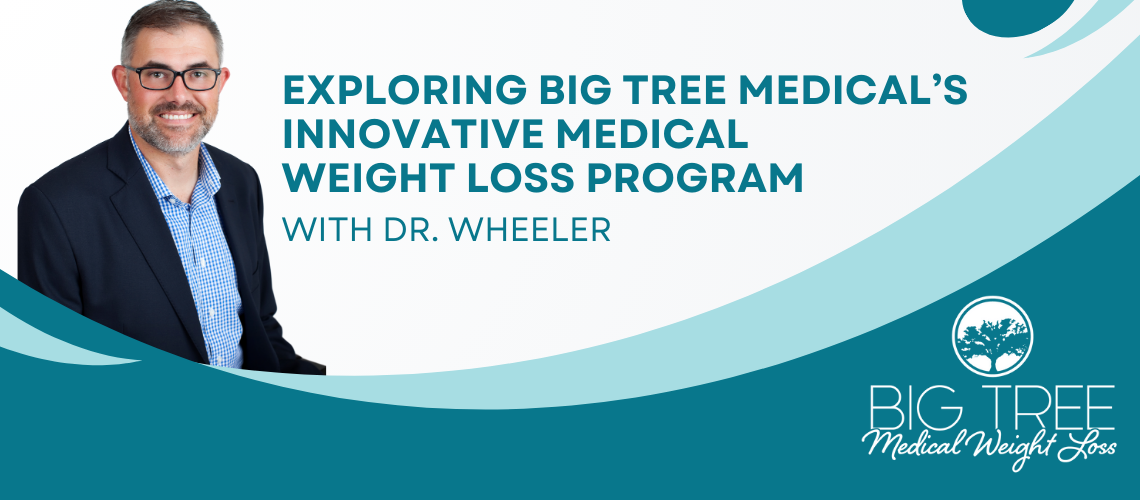At the end of August, Dr. Adam Wheeler hosted an insightful webinar on Big Tree Medical‘s Weight Loss Program, introducing a new approach to healthcare that combines primary care with comprehensive weight management strategies. Here’s a breakdown of the key points discussed during the session:
A New Healthcare Model: Big Tree Medical
Big Tree Medical operates on a simple, affordable membership model, offering patients unlimited access to a personal healthcare team. This membership includes primary care services such as preventative care, acute condition treatment, chronic disease management, and mental healthcare. Whether interacting in person or via text, patients quickly see why Big Tree Medical is a leading healthcare option for individuals and groups.
The program treats conditions like obesity as chronic diseases—just like hypertension or diabetes—rather than as moral failings or lifestyle choices. This ensures that patients receive the compassionate care they need to improve both their overall health and well-being.
The Reality of Obesity: Beyond Diet and Exercise
Dr. Wheeler emphasized that diet and exercise alone aren’t enough to effectively combat obesity. If they were, the current obesity epidemic—where 40% of U.S. adults are classified as obese—wouldn’t be so widespread. He highlighted that obesity is a biological issue involving complex hormonal interactions, especially with ghrelin and leptin, which regulate hunger and metabolism. This is not a matter of willpower but of science.
The Importance of Medication in Weight Loss
One of the key themes of the webinar was the essential role of medication in long-term weight loss. Dr. Wheeler explained that for individuals with a BMI over 30—or over 27 with certain comorbidities—medication should be part of their weight loss strategy. The body’s natural tendency to regain lost weight, coupled with hormone imbalances, often makes lifestyle changes alone insufficient for sustainable results.
FDA-Approved Medications and Their Effectiveness
Dr. Wheeler reviewed several FDA-approved weight loss medications, with a focus on GLP-1 receptor agonists like semaglutide (marketed as Ozempic and Wegovy) and tirzepatide (Mounjaro). These drugs help reduce appetite, slow stomach emptying, and make patients feel fuller longer. For many, these medications result in significant weight loss—often 15-20% of their body weight over a year.
Compounded Medications: An Affordable Alternative
Big Tree Medical’s program offers access to compounded medications, custom-made by sterile compounding pharmacies. These can provide a more affordable alternative to brand-name drugs, costing between $200 and $300 per month, compared to $500 to $1,000 for branded versions. In times of drug shortages, these compounded options ensure patients continue to receive the treatment they need.
Comprehensive Care and Personalized Treatment Plans
Big Tree Medical’s membership program includes 24/7 access to healthcare providers, with personalized treatment plans tailored to each patient’s needs, preferences, and medical history. Whether addressing obesity, hypothyroidism, or other chronic conditions, patients benefit from coordinated care that focuses on their total health.
Success Stories and Real Results
Throughout the webinar, Dr. Wheeler shared inspiring success stories of patients who have lost significant weight through the program. These transformations not only improved their appearance but also reduced their risk for serious health issues like cardiovascular disease and type 2 diabetes.
Getting Started with Big Tree Medical
Dr. Wheeler outlined how easy it is to join the program. Patients can choose between virtual or in-person memberships, with prices starting at $55 per month for virtual care and $70 per month for in-person care. After enrolling, patients can expect to meet with a provider within a few days, start their personalized weight loss journey, and have medications delivered right to their door.
Conclusion: A New Era in Weight Loss Management
Dr. Wheeler’s webinar showcased Big Tree Medical’s innovative approach to weight loss, treating it as a chronic disease requiring medical support. With affordable access to cutting-edge medications and a dedicated healthcare team, patients are empowered to achieve lasting weight loss and improved health outcomes.
For those ready to take control of their weight and overall health, Big Tree Medical offers a promising, comprehensive path forward.
Yes, GLP-1 medications have been effective for individuals with PCOS. We’ve seen remarkable results, especially for those who have both PCOS and obesity. Weight loss often leads to significant improvements in PCOS symptoms, making it a beneficial treatment approach.
We believe tirzepatide will likely come off the shortage list soon. While the FDA officially designates it as “in shortage,” it also notes that all doses are currently available. However, it’s important to be prepared for potential price increases once the shortage ends.
In some cases, yes. Ideally, patients can implement lifestyle changes such as healthier eating and increased physical activity, which may allow them to discontinue the medication over time. However, some individuals may need to continue with a lower dose or a different medication long-term to manage their appetite and maintain weight loss.
Yes, we can manage high blood pressure as part of your care. We provide home blood pressure monitoring kits, and most of these medications are available at no cost and can be shipped directly to your home.
Yes, in fact, it’s a great idea. Research shows that GLP-1 medications can benefit patients with heart failure and cardiovascular disease, making it a suitable option for those with these conditions.
Yes, muscle loss can be a concern. Ideally, we would prevent any muscle loss during weight loss, but that’s not always possible. Obesity presents greater long-term health risks, so the benefits of weight loss generally outweigh this downside. Muscle loss can be minimized with regular exercise, but some degree of muscle breakdown may occur as part of the body’s natural response to calorie restriction.
For the 10 mg dose, a month’s supply typically costs around $415.
Some health insurance plans are starting to cover weight-loss medications. In these cases, we can prescribe the medication through a regular pharmacy, and your insurance would cover the cost. However, many patients still find our membership program to be more affordable. Keep in mind that health insurance typically does not cover treatments when obesity is the sole diagnosis.











